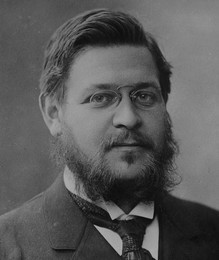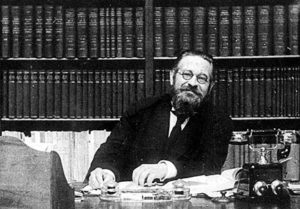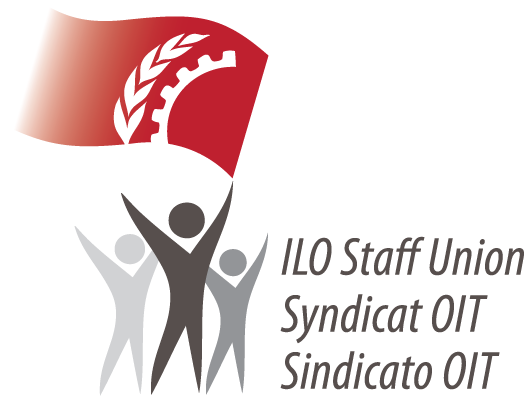Recalling Albert Thomas / Edward J. Phelan, Director-General 1941-1948
Category : Centenary - Testimonials
Albert Thomas, ILO’s first director, was born on 16 June 1878 and died on 9 May 1932. His memory is still very much alive at the ILO. The following is based on a speech given in 1934.
As Phelan points out, the struggle for social justice was the principle of life for Albert Thomas. “Social justice is not easy to define. To Albert Thomas it meant much more than the removal of social injustice. It meant a positive policy through which the individual might attain his political, economic and moral rights. This was the doctrine which he believed could alone give the Organization a real unity and personality, which could guide it safely where narrower doctrines would inevitably lead it to a division along lines of national interest.”1
IE

I first met Albert Thomas in January 1920. He had come to London to assume the weighty task of Director of the ILO.
It was on this occasion that he did me the honour of summoning me to his side. I worked with him until he died. I was with him at all the meetings of the Governing Body and at every session of the International Labour Conference; I accompanied him on his important political missions to America and the Far East; I accompanied him on less distant, but perhaps more dangerous, missions to the Court in the Hague.
I was thus able to observe his work in detail and, as a citizen of a small country, Ireland, somewhat removed from the world’s mainstream, I can bear witness to his work without being influenced by any national or political bias.
Of our first meeting, it will perhaps surprise you, I retain the memory of a man who was silent, who listened, who did not speak. Much more frequently thereafter, I saw him vibrant with energy, imposing his creative will upon everyone, seething with impatience in the face of obstacles, performing with prodigious activity.
He sometimes quoted a saying of Saint Simon: “To do great things one must have passion.” And he had a passion, the passion of achievement, which consisted of an overwhelming energy, an impatience at times ending in outbursts of anger, an appetite for combating the obstacles which arose along his way.
But, behind all that, there was detached reflection. If he succeeded in overcoming difficulties, it was because he had weighed them up calmly, without any illusions, without allowing his burning desire to succeed to lead him to disdain or disregard them.
I now understand his silence in London. He had a vision which was much more farsighted than ours. He alone saw the immensity of the task that lay ahead, and before rushing into it, he measured it and prepared his plan.
What was this task? To create the International Labour Organization. It is true that the Washington Conference had been a success. But it was only the epilogue of the Peace Conference, the final surge of an end-of-war feeling which was somewhat fleeting.
The Constitution of the International Labour Organization was not in force. All that existed, like the decisions taken at Washington, was ink on paper. This had to be turned into men and things. Albert Thomas took those words and made the ILO out of them.
How? The office had to be put together with people of different nationalities, i.e. with different work methods, ways of thinking, and traditions. And for that no model, no experience, existed to guide him. Something entirely new had to be invented, neither French nor English, nor a copy based on any national model.
He did it. Such an achievement, all by itself, would have sufficed to ensure his renown as an administrator. But that was not enough.
First, Albert Thomas crafted the mechanism. But he also wanted, with what vision and good reason, to make this mechanism a living thing, to provide it with a conscience, a faith.
He did this, and at the same time he defined for the first time the nature of an international official and of his responsibilities. There he was treading on much more dangerous ground, where he was likely to arouse the bias of national sovereignties.
But he realized that no international organization could succeed if its international character were to give way to any kind of national pressure. He defended his institution and his staff on all sides against this sort of pressure, with the courage of his unfailing conviction.
Even as regards France, he did not hesitate to go to the Permanent Court of Justice and plead the thesis of the ILO’s competence in the field of agriculture when the French Government supported quite the opposite. He won his case: it is to France’s credit that it bowed to the opinion of the Court and did not hold it against Albert Thomas for having done his duty as Director of the ILO.
And so the Office was created, with officials of different nationalities, organized as a team, animated by a common spirit. Its competence was assured. Still this was not enough. The ILO, as the International Labour Organization is commonly known, is not, believe me, just a spacious building in Geneva, on the shores of the blue lake, housing distinguished officials.
The ILO is made up of 58 nations; it is a mechanism for collaboration amongst those nations, a complicated mechanism which must mesh together Councils of Ministers, parliaments, national and even colonial administrations, labour and medical inspection services, employers’ and workers’ organizations and, along with them, the individuals themselves, parliamentarians, administrators, employers, workers.
All this existed only in legal texts. Governments were only imperfectly aware of their obligations, administrations understood them only in an abstract manner, professional organizations were not aware of either their rights or their duties; public opinion and the masses knew nothing at all about them. This was the situation in not just one country but in all of them.
Creating habits of continuing collaboration amongst these diverse elements in over 50 countries was a superhuman task. Albert Thomas accomplished it.

He accomplished it through unbelievable personal effort, through constant travel in all the continents, in almost every country in the world, and thanks to a strong effort of ubiquity which kept him, no matter how distant, at the head of his administration; whether in Washington or Tokyo, he was still in Geneva.
I could tell you a great deal about those trips, each of which presented different problems. I will relate only one, which is astonishing: in all countries, despite their diversity, he had to employ the same personal influence that you knew in France, the same power of intellectual seduction; he always succeeded in obtaining a response of trust and understanding.
If he achieved this, it is because he deserved it. He had, it is true, exceptional gifts for it: a strong personality, alluring charm, a knowledge of things and of men, and the will to succeed. But his success did not come from these gifts alone; he added to them a formidable work effort. He never visited a country without first having studied it in depth: history, politics, industry, and even culture and art.
How could one refuse what he was requesting when he came to discuss, not about distant international problems, but about specific national problems of the day, concerning which he made clear the obvious links, unperceived until his visit, to the work of the ILO? When he had finished his trip to China, several Chinese said to me: “He’s the first European statesman to understand China.”
Even with all this travel, his task was far from over. Contacts had been established, the wheels were turning, Governing Bodies, Conferences and Committees were meeting: it all had to be endowed with a direction, a spirit. There again, he succeeded through huge personal effort. He thought; he thought for the Conference; but he led the International Labour Conference to thinking as he did.
In the Organization’s early years, an Englishman once made a witty comment which was a bit cruel: “The Governing Body”, he said, “is not a body and it doesn’t govern anything.” And that was true.
Albert Thomas dominated his Governing Body; he imposed decisions upon it from the start. But he did not have the mind of a dictator. He wanted to create a body which was a genuine Governing Body, even if he had to rise up against it at times. He succeeded: today a Governing Body exists which governs.
In this way, year by year, Albert Thomas brought the Governing Body to understand its responsibilities, and to take them. Year by year, he got the Conference, which was inclined to restrict itself to its technical agenda, to examine the social problem in its entirety, to see as he did the never-ending new problems, to unite with him in seeking solutions.
I will not speak to you about these solutions and the ideas which inspired them. The subject would be too vast. What I have attempted to do is to show you an aspect of Albert Thomas’ work which was maybe not unknown, but which was insufficiently understood.
His life principle was the struggle for social justice. But for him, social justice was not something abstract. He understood it as a fact, which had to be made real by genuine progress from one Conference to another. Within a gigantic vision, he perceived the instrument whereby such progress could be obtained. He conceived this instrument on a worldwide scale; he understood that it had to be central to administrations and organizations of all countries.
For anyone else but him, it would have been a fantastic dream; for him it was a plan. Through prodigious effort, which will one day be considered a legend, he made this plan a reality.
If the ILO exists today as a powerful organization, a network encircling the globe, we owe it to him. And if the ILO stands firm, if it does not falter at a time when faith in international organizations appears to be hesitant, it is because he has provided it with a spirit and a personality, along with a well-oiled mechanism.
He did so knowingly.
At the laying of the cornerstone of the present ILO building, he said: “A soul will reside within the house we are going to build.” That soul lives there, a soul that he created.
It will continue to live there for as long as there are men who are inspired by his principles, for as long as human intelligence refuses to abdicate before the challenge of poverty and of injustice.
 The Section of Former Officials of the ILO
The Section of Former Officials of the ILO